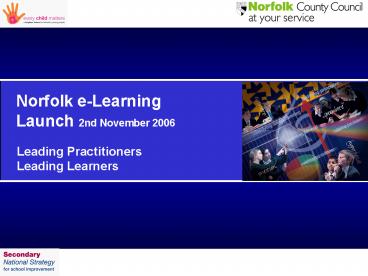Leading Practitioners Leading Learners - PowerPoint PPT Presentation
1 / 13
Title:
Leading Practitioners Leading Learners
Description:
The future of CPD is very different from the present model ... the Internet to Al Qaeda, the teetering electricity grid to old school ties, we ... – PowerPoint PPT presentation
Number of Views:20
Avg rating:3.0/5.0
Title: Leading Practitioners Leading Learners
1
Leading PractitionersLeading Learners
2
A bit of background
- The future of CPD is very different from the
present model - the National Strategies are adopting the Blended
Learning approach - Blended Learning is one particular expression of
a far broader development - economic, social, technological and educational
trends are all moving in the same direction - e-learning, and networks of e-learners, is an
essential element in the coming model of CPD
3
An unfairly exaggerated picture of CPD today . . .
- one-size-fits-all
- top-down
- one-off
- done to the learner
- not thought through
- not responsive to real need
- not disseminated
- not embedded
- not owned
- not reflected upon
Its not working and its certainly not value for
money!
4
A vision of a better future
- Blended Learning is an approach to learning that
- enables the learner to make informed choices
about which materials to use, matched to their
own development needs - helps the learner review the effectiveness and
impact of the use of the materials on their role
in school - gives the learner flexible access to ICT-based /
on-line learning and web-based materials - complements face-to-face professional development
activities - supports professional learning communities (e.g.
networks) and peer-to-peer learning at local
level and through web-based learning
5
Wider developments in thinking about learning
- Blended Learning is only one brand which builds
on current thinking about how people learn - Constructivist learning theory
- learners construct knowledge for themselves
- each learner individually (and socially)
constructs meaning for themselves as they learn - therefore its more productive to concentrate on
the learner than on the subject to be learned - there is no knowledge independent of that
constructed by the learner - or community of
learners.
6
Social constructivism
- Lev Semenovich Vygotsky
- Piaget people should construct their own
version of truth - Vygotsky its important to discuss our version
of truth with others - this mediation gets us to a higher order of truth
- its socially tested
7
The future is networked economics and society
Principles such as mass production and
one-size-fits-all are now completely
outdated. The Support Economy, Why Corporations
Are Failing Individuals and the Next Episode of
Capitalism Maxmin and Zuboff, 2002 From the
Internet to Al Qaeda, the teetering electricity
grid to old school ties, we live in a world of
networks. Network Logic Who governs in an
interconnected world? Ed. McCarthy, Miller,
Skidmore pub. Demos 2004
8
The future is networked technology and education
Only connect Howards End by E.M. Foster
1910 Telegraph, telephone, radio, television,
email, the net, mobile phones, broadband,
wireless, Web 2.0 Personalisation It is only
possible for schools to begin to assemble
solutions for the real needs of individual
learners if they work in partnership
9
Thats enough theory Ed.
- e-learning networks
- enable learners to connect
- with each other
- with each others connections
- enable learners to share
- resources
- ideas
- reflections
- links
10
Who?
- Initial target groups
- Norfolk ASTs
- Personalisation and intervention
- Assessing Pupil Performance in English then maths
- Intervention
- Study Plus pilot
- English and maths teachers, TAs and SL
- Intervention Team
- English and maths teachers, TAs and SL
- self-study modules
- Advisers
- blogs
- reflecting, opinionating, discussing
11
The offer
- Support
- training
- platform familiarity
- blogging
- podcasting
- video documentation and communication
- maintenance / e-moderation
- sparks
- advice and support
- modelling good practice
12
The anticipation
- Engagement
- regular and reasonably frequent
- at least weekly?
- active
- with increasing confidence
- share ideas, insights, resources
- open self-reflection
- using the range of platforms as appropriate
- network-aware
- host as well as visit
13
What is to be done?
If you and your colleagues (e.g. Study Plus TAs,
SL i/c intervention, ASTs) are to be active
participants and / or supporters of e-Learning
networks, what do you need to do and to access?
- hardware
- training
- advice and support
- time
- other?































